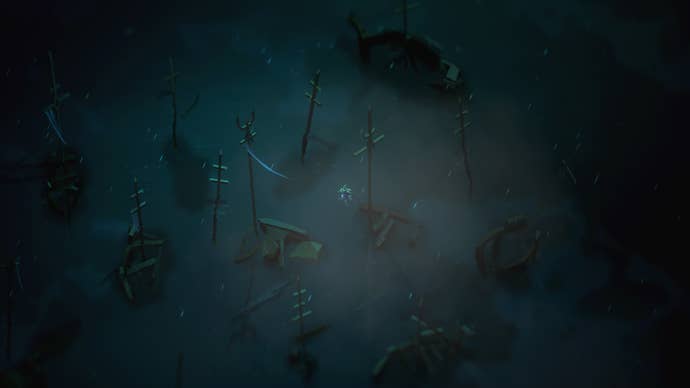Prepare to die and die and die.
Welcome back toSouls Week.
This piece contains spoilers for the ending of Below.

Why do we play Soulslike games, those brutally difficult games based on From Software’s now-iconic formula?
Is it the frustration of falling off of a tricky platform in Blighttown?
Is it the satisfaction of perfectly strafing and executing a successful backstab?

Or is it that feeling of accomplishment?
That feeling of dying and dying and dying, again and again and again.
Difficult games are built on this feeling.

On this loop of agony and elation, frustration and triumph.
Beating tough games can become a form of therapy, as it is inCeleste.
Am I good enough?"

But Capy’s 2018 roguelike, Below, doesn’t inspire the same feeling, despite its brutal difficulty.
The game follows wanderers who sail to an isolated island and descend into the depths of it.
Each death leads to another wanderer landing on the ominous shores, attracted to something below.

On the surface, it should fit snugly next to games like Dark Souls.
Each victory is met with a reminder that something worse waits below.
You know what comes next and you know it can kill you again.
Half-way through your descent, the game introduces ghoulish humanoid enemies who frantically crawl on all fours.
I suspect the answer to that question can be found in the game’s wild ending.
It’s a devilish twist with, again, no joy or triumph to be found.
If this is the case, it’s disturbing.
But there is something here about being attracted to darkness.
It’s just that unlike most Soulslike games, there’s no glory or victory here.
Violence and death are bad and Below doesn’t change that.
This attraction to darkness, to violence, manifests itself in real ways in Below.
It’s something that’s followed us throughout time, something that we can’t escape.
The vikings were defined by death and so are we.
You die and you die and you die.
The death counter hits triple digits in Celeste.
You almost smash your third controller in Dark Souls.
The game starts again.
Death isn’t followed by credits in real life and that’s the case here too.
Below’s addition of roguelike elements to the Souls formula should be more widely explored.
So, to return to my earlier question of why I couldn’t stop playing?
I reckon it’s for the same reasons the wanderers keep turning up to an island filled with death.
We’re attracted to that darkness, being pulled below.
Below isn’t a game for everyone, or for most people.
But just like Dark Souls and Celeste, Below is a game that says something through difficulty.